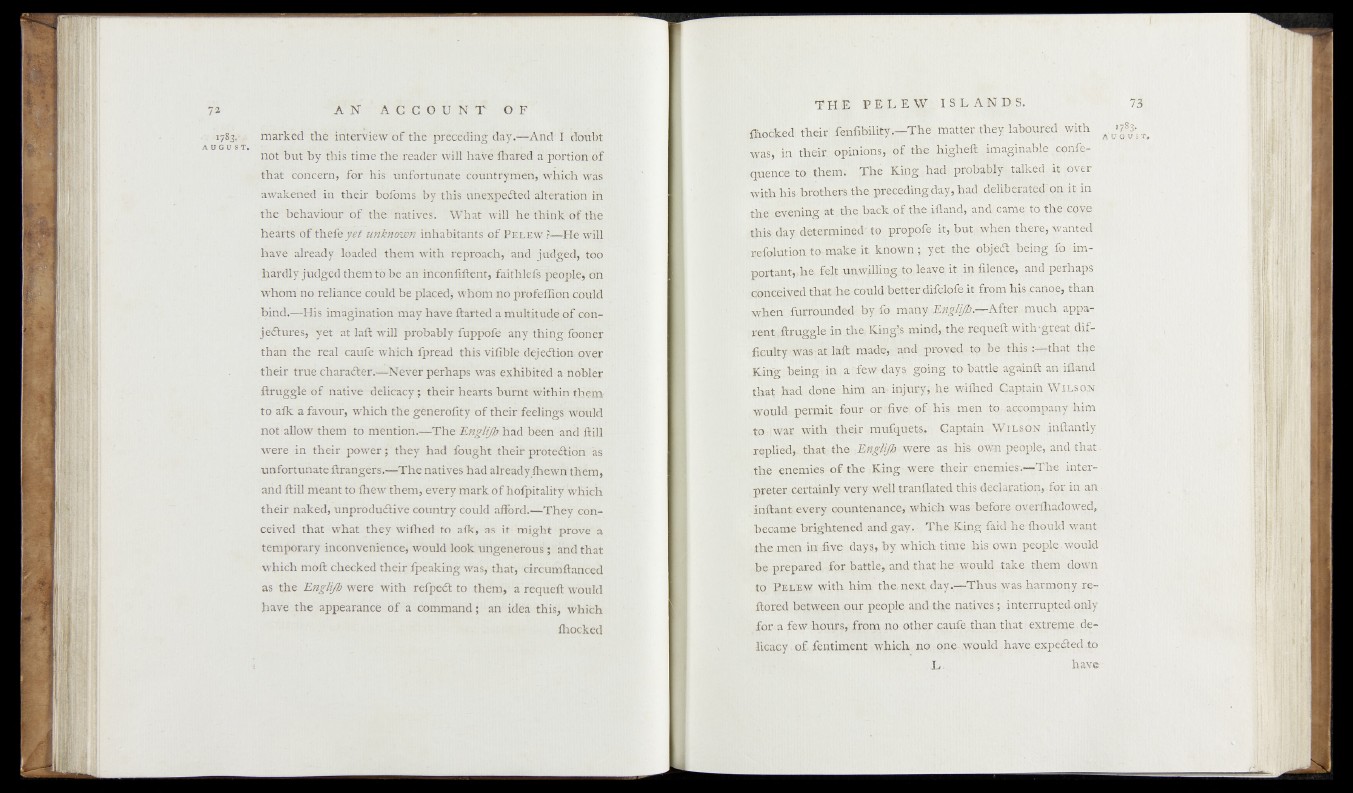
marked* thé in-têrVièw of the'preceding Öay.~Ahd; I d'ottht
not but by thïs titn'e the-feader will havé fhared aportidfotof
that concern, for his unfortunate countrymen, which was
awakened in their hdfoms by this unexpected alteration in
the behaviour of the natives. What will hé think of the
hearts.of thefej/^ unknown inhabitants of Picle# f-— He will
have already loaded them with reproach, and judged, too
hardly^wl^hiithemito be an inconftftent, faifKtefs people, on
whom' no reliance could be placed, whom no profeffion could
bind.— Ills imagination may have ftarted a multitude of cori-
jeéturesf iyét at laft will probably fuppofe any thihglföónér
than the real- caufe which fpread this vifible dejedtiom qyer
their true charadter.—Never perhaps was exhibited a nobler
firuggle of native delicacy; their hearts burnt within them-
to afk a favour, which the gènerofity of their feelif^Hiifnfd
not allow-them to mention.—-The Engltjk had been hridT ft ill
were in their power ; they had fought their protection; as
unfortunate ftrangérs.—The natives had alreadyiheWn them,
and ftill meant to fliew them, every mark df hofpitality which
their naked, unprodudlive country could afford.—They conceived
that what they wiflied to alk, as it might prove a
temporary inconvenience; would look ungenerous ; and that
which móft checked their Ipeaking was, that, circumftariced
as the Englijh were with refpedt to them, a requeft Would
have the appearance of a command; an idea this, which
ihocked
T E E P E L E W m I A ^ D l& 73
locked their i fenêbjlfef?—The sipat^r;,tjipyi .Lb^ur^d , with .
t^eiji,’qpSjio^?, of theîj]ÿg^e^;^|^|hable ffiMjjhg
qùencefto .them: *The ^had<prc^|]3lp^td}cp(l^
with his bro6hçr;ath%5prè®|jdi'!lS^# delihe|;a|e|r on it in
th^ gening at-, the hack p f the,ihan(|'? théleoy}e_
;tiis:day d«;ert©«^'-t9 . prqpqff k>
■ Befoln^ionfitojniake it,
portant,>he felt unw^^jt^lqa^e,. it-a$ fiJepce,;|an||;.p^thaP?
conceived that the couldfbejter difc^qfe^t ftqm his^canoe, than
r jyhen furiounded. hy, ft> apptjr> I
rent.ftruggle-jn die, ^ng^s -mind* t^r^u^ ^6h -gçeatf;dj|'-
fifiuljfy#.asTat;l&ft made,: r^nd; prpyed-1© ;!be this ÿ^that the
King being in a ; few- days: going to battle againft an ifland
that had. done him am injury, he wifhed Captain^i j^isr
■ jyould* permit;;four- ortfiye. o^hfe.(men jtqr,apeompany him
to .war with their mufquets. Captain ; W ilson inftantly
replied, that the Engliflj ,wer£ va^^hisHO^pepple^ian^ that
the enemies of the ;K-ingr{yyei;e t^ieir enemies^Tbje interpreter
certainly very well tranllated this declaration, ;for in an J
inft ant. everycountenance,1,which was bqfçpe q^erfliadqw.ed,
, became brightened and gay. The King faid he fhould want
the men in five days, hy which time his-own people would
he prepared for battle, and that he would take them dmyp
,,tq PEiÆjy yrith him the,next.day.-Thus-i^as harmpn.yge-
, ffored bqfwfeen opr people, and the natives;- interrupjt,ecLan|y
for.a few hoqrs, .from, no other paufe^an;that ; e^tremq, de-rI
liçaey .o£ Sentiment which no, one would have, eicpedtedjp
L. | ’ Jhave-
« M l I
T7- G U S T ,